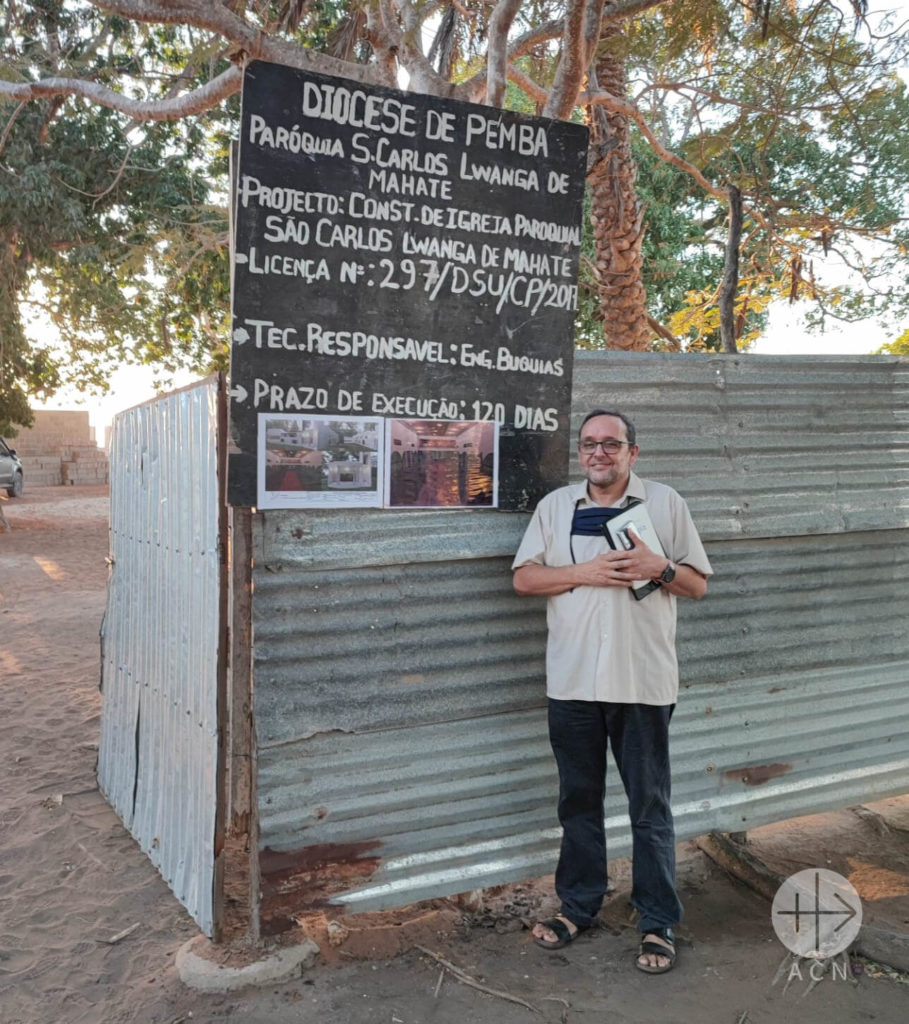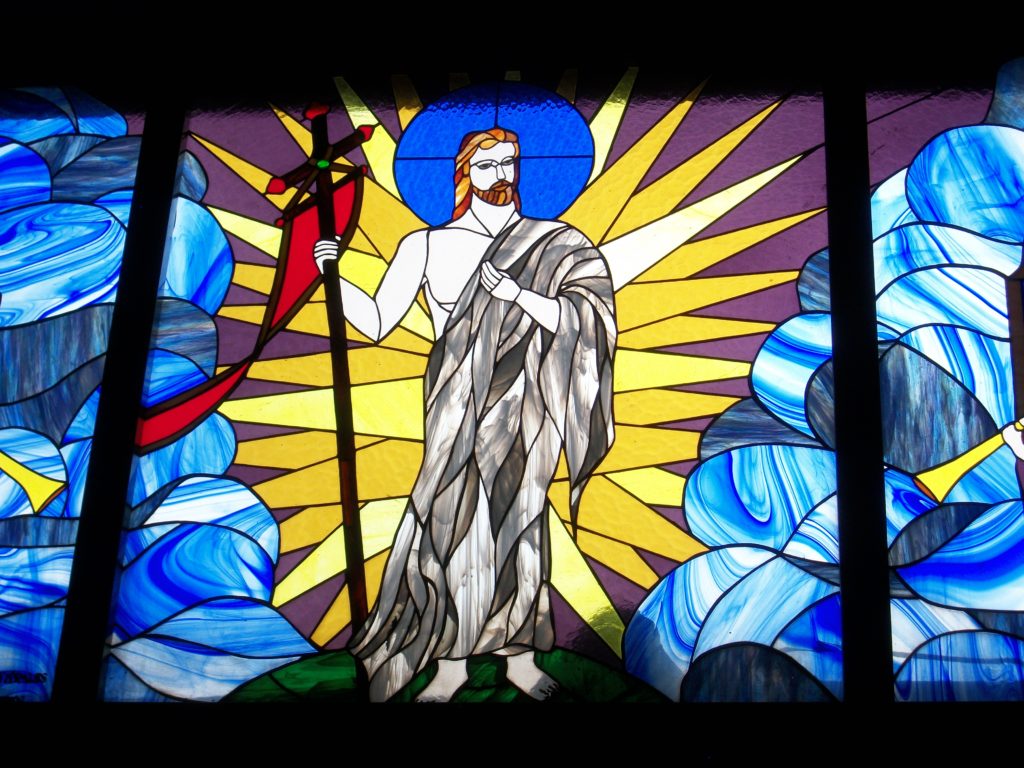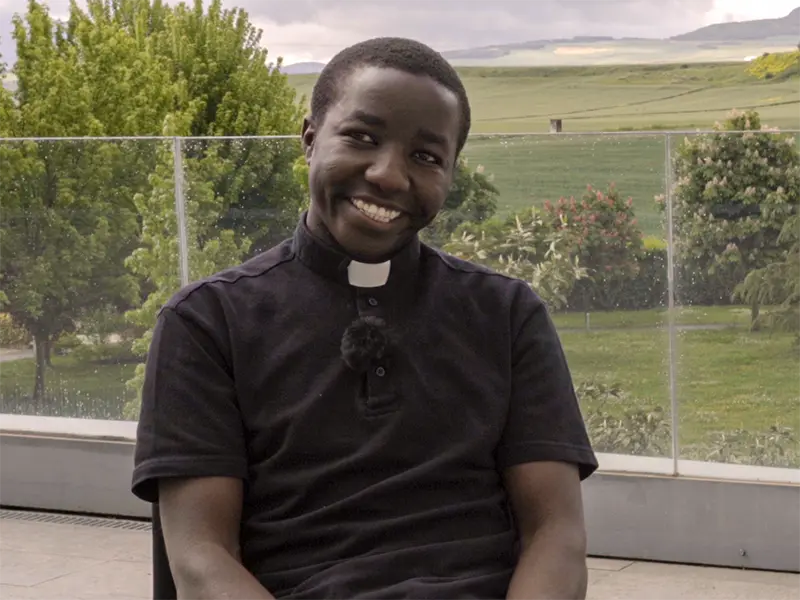Father Eduardo Roca Plans New Church in Mozambique
In a Neighborhood of the Poorest of the Poor

Father Eduardo Roca is a Spanish missionary working in Mahate, a slum on the southern tip of the city of Pemba, in northern Mozambique. In addition to extreme poverty, hundreds of refugees have arrived in Mahate in recent months fleeing terrorist attacks in the north of the region. The neighborhood has a mostly Muslim population, but the parish is steadily growing, and already has more than 2,000 members but without a church where they can meet.
The Aid to the Church in Need Foundation (ACN) has just agreed to help the parish build a church dedicated to Saint Charles Lwanga. Father Eduardo shared his feelings when he received the letter from ACN, assuring him of its support:
“Amid the tragedy, when eyes were only on the wounds when it seemed that nothing would happen, despair would overwhelm everything, the letter of donation for the church arrived.
Someone saw what the blind man on the road must have seen, he who could not see. Someone set their eyes behind the fire and the storm and glimpsed hope beyond.
They come from Aid to the Church in Need and that’s what they do: help Christians suffering around the world… with eyes to see beyond the darkness of evil.
If, in an extreme and critical situation, amid a humanitarian tragedy still unfolding, you suddenly receive such news, you take notice of the surprise from the God of the Gospel.
Years ago, when so many theories filled my mind, with indisputable arguments, I would have personally questioned the necessity or even the pastoral truth of building a church. Even more so since a context of extreme poverty, poor housing for many, and the irrefutable lack of basic services to live with dignity is clearly a challenge that can trump other dubious needs, such as a church.
I cannot help but think about the words of the Apostle Judas, about the expensive perfume of nard, which the woman poured on the feet of Jesus. If anything can be justified, completely justified, it is to give to the poor what this unscrupulous system steals from them every day. The response from Jesus hurts me. How can he say this? That we will always have the poor with us… How many will have justified their way of life with such words!… Enigmatic words, like so many he uttered.
The other side of the quote, that “you will not always have me”, seems to suggest that we build churches and spend a lot on an expensive nard perfume.
The walls are already up, and you can already imagine a little what it will be… I spend hopeful moments in it because I feel it is permeated by the future… It is as if this mountain of cement was shouting, there in its stillness, like a prophet hurt by all this terrible reality, that the world of the future belongs to God!
When I arrived in Mahate, the first mission in the city of Pemba, my community was a small remnant of God’s poor, with very little understanding of God’s ways… On their arrival, the first missionaries settled in a village that already had a thousand years of Islamic tradition. The mission was a quasi-parish since it lacked what was needed to be fully one.
Those closest wanted a church because we had to use the garage of the missionaries’ old house as a chapel. But at least in the first two or three years, we didn’t need more room… More Christians began to come on Sundays as families grew larger. I always said the same thing. We need living stones, not dead ones… And it was these, which, undoubtedly, the Spirit was calling…
I had to build a large shelter to protect them from the sun and the rain. Today so many people come that several are left outside for lack of room inside… In the last three years, our communities have grown; there are already five now, especially with the arrival of fellow Christians from the north, fleeing terrorist attacks.
Even though this is a sufficient reason to build the church, for me it is not the main one. Those who convinced me the most are the other brothers, the Muslims. At present, many of them approach our chapel, enter the enclosure and are not afraid. Fear and prejudice are the worst threats to peace. In almost ten years since I have been here, one of my greatest concerns has been the search for a place in which we can meet, acknowledge each other, and engage in dialogue. Imams have been coming here lately, and I see with gratitude that nowadays they feel confident at a time when it is so easy to stigmatize.

The church that is rising bears witness to the encounter, to unconditional acceptance and dialogue.
Only this view can help us understand that money can be spent on the bottle of pure nard, and that the poor will still be with us.
What ACN has given us is this bottle so that the whole neighborhood can scent the Gospel’s good fragrance… Many of those who pray in the seven mosques around us can smell it too. They know that this house is open, that it heals wounds, accompanies and takes care… That too smells good…”
If you want to be part of this story, of the living Gospel, and help Father Eduardo finish building the Church of St Charles Lwanga, please support ACN’s project.
Related

Reflection by Bishop Enrique Díaz: Alleluia, alleluia
Enrique Díaz
20 April, 2025
5 min

Christ is Risen! Alleluia! Commentary by Fr. Jorge Miró
Jorge Miró
20 April, 2025
3 min

Easter: Mystery of Freedom
Carlos J. Gallardo
20 April, 2025
5 min

“Being Catholic in Tanzania is a source of pride”
Fundación CARF
16 April, 2025
6 min
 (EN)
(EN)
 (ES)
(ES)
 (IT)
(IT)

